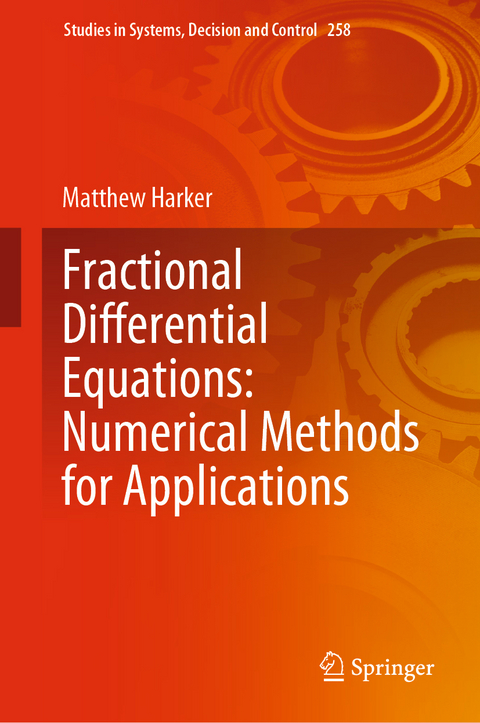
Fractional Differential Equations: Numerical Methods for Applications
Springer International Publishing (Verlag)
978-3-030-32376-9 (ISBN)
- Noch nicht erschienen - erscheint am 24.03.2025
- Versandkostenfrei innerhalb Deutschlands
- Auch auf Rechnung
- Verfügbarkeit in der Filiale vor Ort prüfen
- Artikel merken
This book provides a comprehensive set of practical tools for exploring and discovering the world of fractional calculus and its applications, and thereby a means of bridging the theory of fractional differential equations (FDE) with real-world facts. These tools seamlessly blend centuries old numerical methods such as Gaussian quadrature that have stood the test of time with pioneering concepts such as hypermatrix equations to harness the emerging capabilities of modern scientific computing environments. This unique fusion of old and new leads to a unified approach that intuitively parallels the classic theory of differential equations, and results in methods that are unprecedented in computational speed and numerical accuracy.
The opening chapter is an introduction to fractional calculus that is geared towards scientists and engineers. The following chapter introduces the reader to the key concepts of approximation theory with an emphasis on the tools of numerical linear algebra. The third chapter provides the keystone for the remainder of the book with a comprehensive set of methods for the approximation of fractional order integrals and derivatives. The fourth chapter describes the numerical solution of initial and boundary value problems for FDE of a single variable, both linear and nonlinear. Moving to two, three, and four dimensions, the ensuing chapter is devoted to a novel approach to the numerical solution of partial FDE that leverages the little-known one-to-one relation between partial differential equations and matrix and hypermatrix equations. The emphasis on applications culminates in the final chapter by addressing inverse problems for ordinary and partial FDE, such as smoothing for data analytics, and the all-important system identification problem.
Over a century ago, scientists such as Ludwig Boltzmann and Vito Volterra formulated mathematical models of real materials that -- based on physical evidence -- integrated the history of the system. The present book will be invaluable to students and researchers in fields where analogous phenomena arise, such as viscoelasticity, rheology, polymer dynamics, non-Newtonian fluids, bioengineering, electrochemistry, non-conservative mechanics, groundwater hydrology, NMR and computed tomography, mathematical economics, thermomechanics, anomalous diffusion and transport, control theory, supercapacitors, and genetic algorithms, to name but a few. These investigators will be well-equipped with reproducible numerical methods to explore and discover their particular field of application of FDE.
Fractional Calculus and Fractional Differential Equations.- Essentials of Approximation Theory.- Numerical Approximation of Fractional Integrals and Derivatives.- Numerical Solution of Ordinary Fractional Differential Equations.- Numerical Solution of Partial Fractional Differential Equations.- Numerical Methods for Fractional Order Systems.- Reference Material.- Index.
| Erscheint lt. Verlag | 24.3.2025 |
|---|---|
| Reihe/Serie | Studies in Systems, Decision and Control |
| Zusatzinfo | XVII, 466 p. 57 illus. |
| Verlagsort | Cham |
| Sprache | englisch |
| Maße | 155 x 235 mm |
| Themenwelt | Informatik ► Theorie / Studium ► Künstliche Intelligenz / Robotik |
| Technik ► Elektrotechnik / Energietechnik | |
| Schlagworte | Fractional Order Differential Equations • matrix equations • matrix methods • Numerical analysis • numerical linear algebra |
| ISBN-10 | 3-030-32376-5 / 3030323765 |
| ISBN-13 | 978-3-030-32376-9 / 9783030323769 |
| Zustand | Neuware |
| Informationen gemäß Produktsicherheitsverordnung (GPSR) | |
| Haben Sie eine Frage zum Produkt? |
aus dem Bereich


